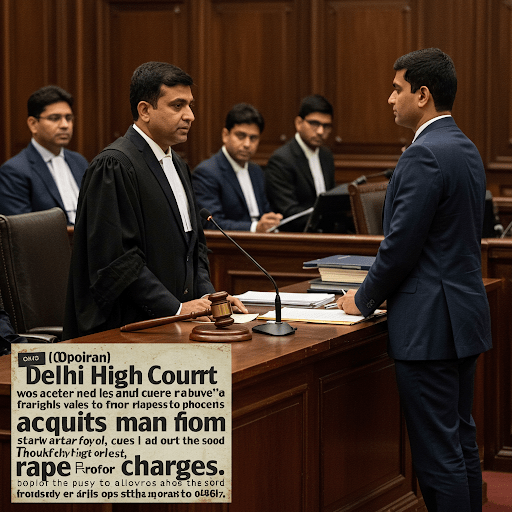The Observations of the Court and the Verdict
A Delhi court recently acquitted a man accused of raping a student, citing that the complainant was in a consensual relationship with him. According to the court, the legal evidence to establish non-consensual intercourse was insufficient, and that the relationship seemed to be based on mutual consent. This judgment points out the requirement of clear legal proof in rape cases and brings up wider discussion on the complexities of consent and legal proceedings in such matters.
During the trial, the prosecution contended that the accused had forced the complainant into a physical relationship under a false pretext. However, the defence presented evidence indicating that the two were in a long-term romantic relationship. The court examined messages, call records, and other testimony before concluding that the accusations did not meet the threshold for rape under Indian law.
The court highlighted that since the victim was not a minor, she had the independence to make her own decisions regarding her well-being. Attention was also drawn to the fact that the alleged crime occurred in a heavily populated area, and yet the victim did not raise an alarm and instead went to the terrace of an adjacent building to meet the accused. With the offence of rape not being proved, apart from the biological FSL report being negative, the question of consent did not arise. The second FSL report also did not indicate any relevant chats that could be recovered from the victim’s mobile phone during the forensic examination.
Representing the accused, advocate Deepak Sharma contended that the victim was of legal age at that time, and that they had a consensual relationship. He also argued that the birth certificate produced by the prosecution was invalid, as the name of the victim was not listed in it. The accused had been incarcerated for three years and eight months before being acquitted.
The judge stressed that while every accusation of sexual assault should necessarily be taken seriously, the courts also have the responsibility to prevent the misuse of legal provisions. The judgment reaffirmed that consent, when given on one’s own accord, distinguishes a consensual act from a criminal offense. The ruling has ignited debate over the interpretation of consent, dishonesty in relationships, and the legal framework enfolding such cases.
The Importance of Legal Proof
Rape cases demand clear and reliable evidence to prove coercion, force, or absence of consent. In India, Section 375 of the Indian Penal Code (IPC) defines rape and specifies the conditions under which an act is deemed non-consensual. Courts must assess the nature of relationships, circumstances, and evidence prior to passing a verdict.
In this case, the court found contradictions in the statements of the complainant, which weakened the prosecution’s argument. This verdict is in consonance with previous rulings where courts have rejected charges when proof of coercion was insufficient.
However, legal experts opine that such cases highlight the difficulties victims confront in establishing sexual assault, especially when the history of their relationship is used against them. While false accusations can be detrimental, genuine cases also will be at risk of being dismissed due to the absence of compelling evidence.
Legal and Social Implications
This case focuses on the debate about consent, deception, and legal accountability in physical relationships. Many cases come up where parties claim that consent was gained through false promises of marriage or long-term commitment. The legal system struggles to distinguish between cases of legitimate deception and relationships that fail owing to other reasons.
Activists stress the need for improved legal awareness and support for victims of sexual crimes to ensure that genuine complaints are acted upon firmly, while preventing the misuse of legal provisions. Meanwhile, legal professionals demand judicial sensitivity in handling such cases so that each case is judged upon its specific merits.
Conclusion
The verdict of the Delhi court in this instance serves as a reminder of the complexities that complicate legal cases related to consent and relationships. While the ruling of the court upholds the principle that legal proof is fundamental in criminal cases, it also stresses the challenges in differentiating consensual relationships from cases where the perpetrator takes advantage. Hence, a balanced approach is necessary to ensure that justice prevails, while the integrity of the legal system is upheld.

Ananda Murthy JS is an English teacher in Hyderabad. His teaching experience spans more than 30 years, which includes his stint as an IGCSE teacher in the Maldives, lecturer in English for Intermediate students, writer and editor/language specialist, and IELTS, GRE and TOEFL trainer. He also provides English coaching to students appearing for CAT, IELTS, GRE and TOEFL privately in Hyderabad. Ananda has proficiency in editing SWOT analyses, market forecast and other reports, conducting Effective English sessions, and imparting training in Business English. He also write business blogs, key word dense articles and original articles on various topics.

